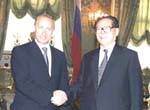Chinese, Russian Presidents Hold TalksJiang, on a state visit to Russia beginning Sunday, made the remarks during a meeting with Russian President Vladimir Putin. The two presidents were expected to sign the treaty following the talks. The treaty legalizes the willingness and determination of the two countries to become good neighbors, good partners and good friends, and discards the Cold-War mentality of allies or confrontation, and represents a new type of nation-to-nation relations, which is to realize security through trusting each other and to cooperate in a mutually beneficial manner, Jiang said. "With this guideline document, a long-term, stable and healthy development of China-Russia relations in the 21st century is ensured," Jiang told Putin. "Our efforts will bring benefits to the future generations, and help contribute to world peace, development and prosperity in the new century." Putin said Russia and China made an important strategic choice to establish strategic cooperative partnership in the 1990s. The new treaty to be signed Monday is another important factor to promote that partnership. The Russian president said the signing of the treaty is not only a major event in the bilateral relations, but also a very important event in international political affairs. China and Russia have seen an increasing trade volume over the past few years. Jiang said there is still great potential in their economic cooperation and trade, and the two sides should work together to increase economic cooperation and trade. Chinese Premier Zhu Rongji will visit Russia in a month and hold the 6th regular meeting between prime ministers of the two countries. Jiang said the two sides should make full preparations and make that meeting more fruitful. Putin said he expects the two-way trade between Russia and China to grow 43 percent this year as the trade volume grew 40 percent last year to 8 billion U.S. dollars. He said Russia will work with China to explore the potential of economic cooperation and trade. In particular, the Russian president said Russia is willing to discuss with China on strengthening cooperation in areas of hi- tech, machinery manufacturing, chemical industry, energy, aerospace and culture. Jiang said China and Russia, as two permanent members of the Security Council of the United Nations, shoulder great responsibilities for world peace and development. China and Russia should make joint efforts to push forward the multi-polarization process of the world and to help establish a democratic, just, reasonable international political and economic order. The two presidents also exchanged views on the issue of anti- ballistic missiles. Putin reiterated the importance of the treaty on the limitation of anti-ballistic missile systems (ABM), and said Russia will continue to work for global strategic stability. Jiang said to maintain global strategic stability is of major security concern to countries across the world and the nuclear powers in particular, and the ABM is a foundation of that. "We spoke highly of the firm stance of Russia to safeguard the ABM, and our two sides have had consultations and coordination over the issue," Jiang said. "We signed a joint statement on anti- ballistic missile systems last year when President Putin visited China, which drew great attention around the world. We are ready to strengthen our cooperation with Russia over the issue." Jiang also extended thanks to the support of Russia, on behalf of the Chinese people, over Beijing's successful bidding for the 2008 Olympics. He invited Putin to pay another formal visit to China next year, and Putin accepted his invitation. |
| People's Daily Online --- http://english.peopledaily.com.cn/ |
